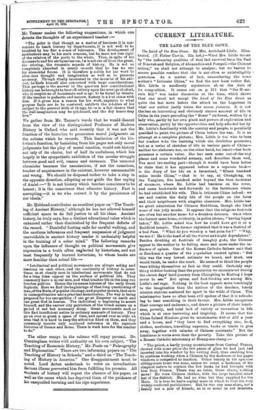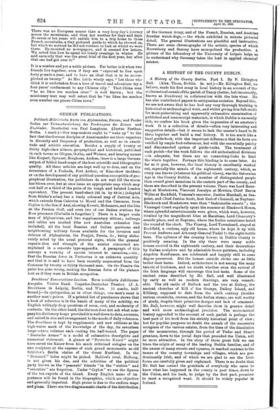C URR,ENT LITERATURE.
THE LAND OF THE BLUE GOWN.
The Land of the Blue Gown. By Mrs. Archibald Little. Illus- trated. (P. Fisher Unwin. 21s. net.)—What Mrs. Little meuas by "the redeeming qualities of that last survival from the Past of Nineveh and Babylon, of Alexandria and Pompeii—the Chinese nation," we shall not attempt to analyse; but we hasten to assure possible readers that she is not often so unintelligibly • granuiose. Is a matter of fact, remembering the same author's "Intimate China," we find the new book rather fiat. Mrs. Little is needlessly mysterious ab int the date of its composition. It comes out on p. 215 that "the Hanle- rule Bill' was under discussion at the time, which shows that one must not accept The Land of the Blue Goan as quite the last news before the attack on the Legations in what our author justly terms the annus /tines/us. It is not the less an interesting and obviously sincere account of life in China in the years preceding the" Boxer" outbreak, written by a lady who, partly by her own pluck and powers of exploration and observation, partly by the opportunities and help afforded her by Mr. Little's familiarity with the country and people, is peculiarly qualified to paint the picture of China before the war. It is no attempt at a complete picture; Mrs. Little is too wise to bore her readers with the learning which she doubtless possesses; but as a series of sketches of life in various parts of China— neither too elaborate nor, on the other band, too smart—her book possesses a certain value. She has seen some out-of-the-way places and some wonderful scenery, and describes them well, Tim most interesting part—though it would have been better to state that it has appeared before as a separate book— is the diary of her life on a farmstead, "fifteen hundred miles inside China," — that is to say, at Chungking, on the Yangtaze, five hundred miles beyond the then terminus of steamers, where Mr. Little had business on the river, and came backwards and forwards to the farmhouse where he had established his wife. This is intimate China indeed : we see and realise the daily life of the people on the farm and their neighbours with singular clearness. Mrs. Little has no great admiration for Chinese Buddhism, though she liked some of the jolly monks. It appears that the religious festivals are often but another name for a drunken debauch. Once when the farmer came home, evidently, in police phrase, "having liquor taken," Mr. Little asked him how he could hsve got it at a Buddhist temple. The farmer explained that it was a festival of a bad Puss. "What do you worship a bad puss. for ?" "Why, we must I He is the head of all the wolves and night depredators.' Besides drinking at festivals of naughty gods, the Chinese appear to the author to be falling more and more under the in- fluene.e of opium. One of the Homan Catholic fathers said that in Saechuan a quarter of the lopulntion smoked opium "But this was the very lowest estimate we heard, and must, one would think, be under the mark. He seemed to think the people were killing themselves as fast as they could. Certainly any- thirg sicklier-looking than the population we encountered during the eleven days' land-journey from Chungking to Eliding 1 hope never to see." But opium and foot-binding are among Sirs. Little'd red rags. Nothing in the book appeals more touchingly to the imagination than the notices of the desolate, lonely mission stations scattered far apart in the wilds of China. The missionaries have so often been evil spoken of that it is refresh- ing to hear something in their favour. Mrs. Little recognises their courage and endurance, and draws a picture of their loneli- ness, poverty, and total lack of variety or recreation in life which is at once harrowing and inspiring. It seems that the China Inland Missions gives its missionaries £.40 or £50 a year and a house, and "they have to find everything else, food, clothes, medicines, travelling expenses, books or tracts to give away, together with salaries of Chinese assistants." But the loneliness is worse even than the poverty. Take this picture of a Roman Catholic missionary at Hoang-muchang :—
" The priest, a hardy young mountaineer from Central France, showed with some price the taw panes of glass he had just had inserted into his window by his writing desk, thus enabling him to continue working when a Chinese by the darkness ot his paper windows is compelled to inaction. Other luxury in his spacious sitting-room there was none, unless we count a bookcase of the simplest nature to contain the few books he had brought with him from France. There was no table, three chairs, nothing more! He wore Chinese clothes, with the large fanciful straw hat of the district. He had no wine but that supplied for the Mass. It is true he hada capital mule on which to visit his very widely-scattered parishioners. But he was one man alone, not a family nor a pair of friends, as is so usual ui our missions. There was no European nearer than a very long day's journey across the mountains, and then not another for days and days. No seven or ten years wilt entitle him to a trip home to those French mountains, a tiny pictured guide to which he showed us, but which we noticed he did not venture to look at whilst we were there. He received no newspapers, and it seemed few letters. We asked him how he spent his lonely evenings in winter. He said earnestly that was the great trial of the first year, but after that one had got over it."
It is a sombre and yet a noble picture. Far better is it when two friends live together, even if they are "expected to live upon forty pounds a year, and to have an ideal that is to be accom- plished on twenty." As Mrs. Little wisely says, "Let those who think it is undertaken from a love of travel and adventure try a four years' confinement to any Chinese city.' That China man " he no likee too lunches cross" is well known ; but the
missionary man may well retort that he "no likee too muchee even number one piecee China town."



























































 Previous page
Previous page